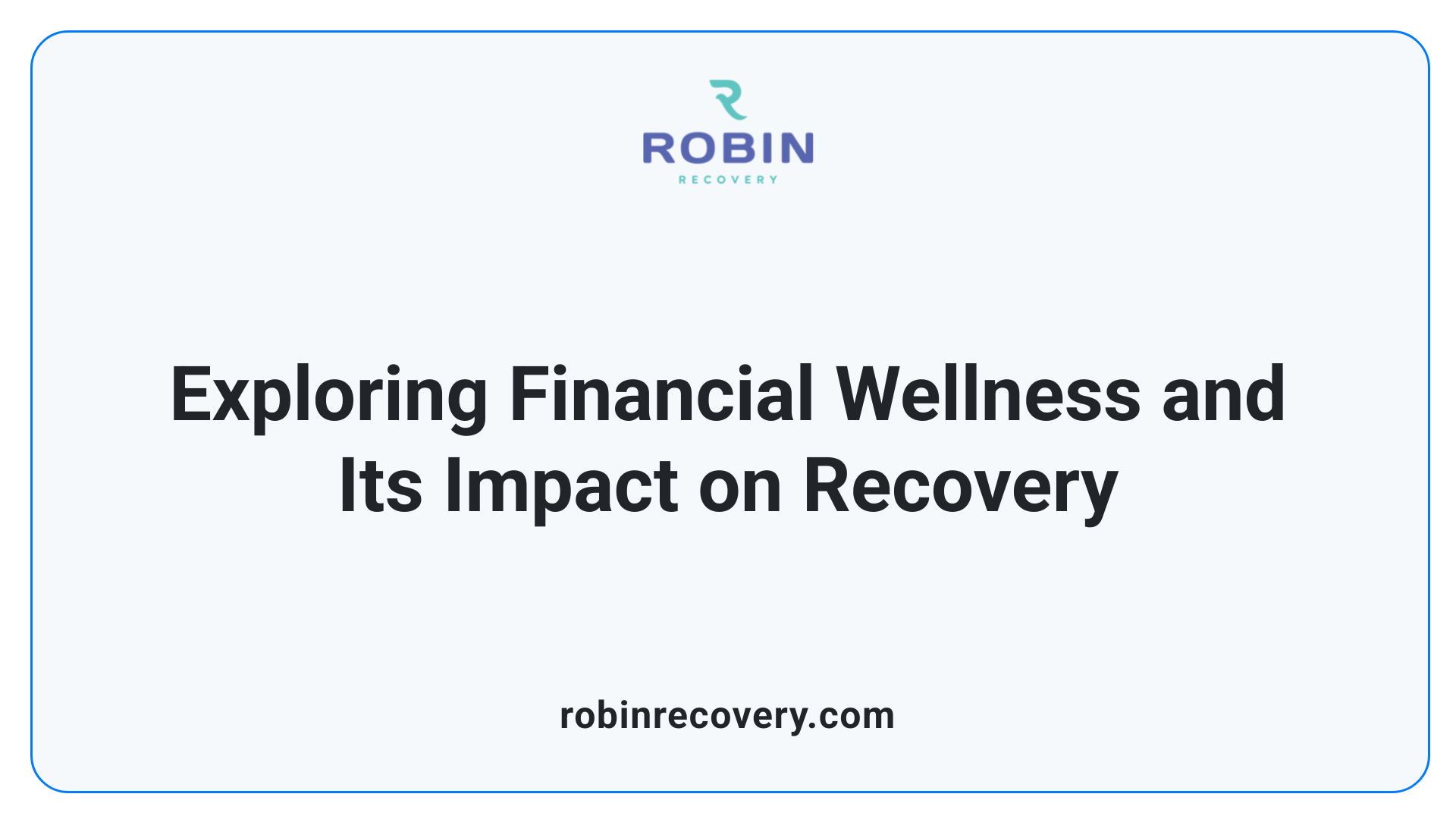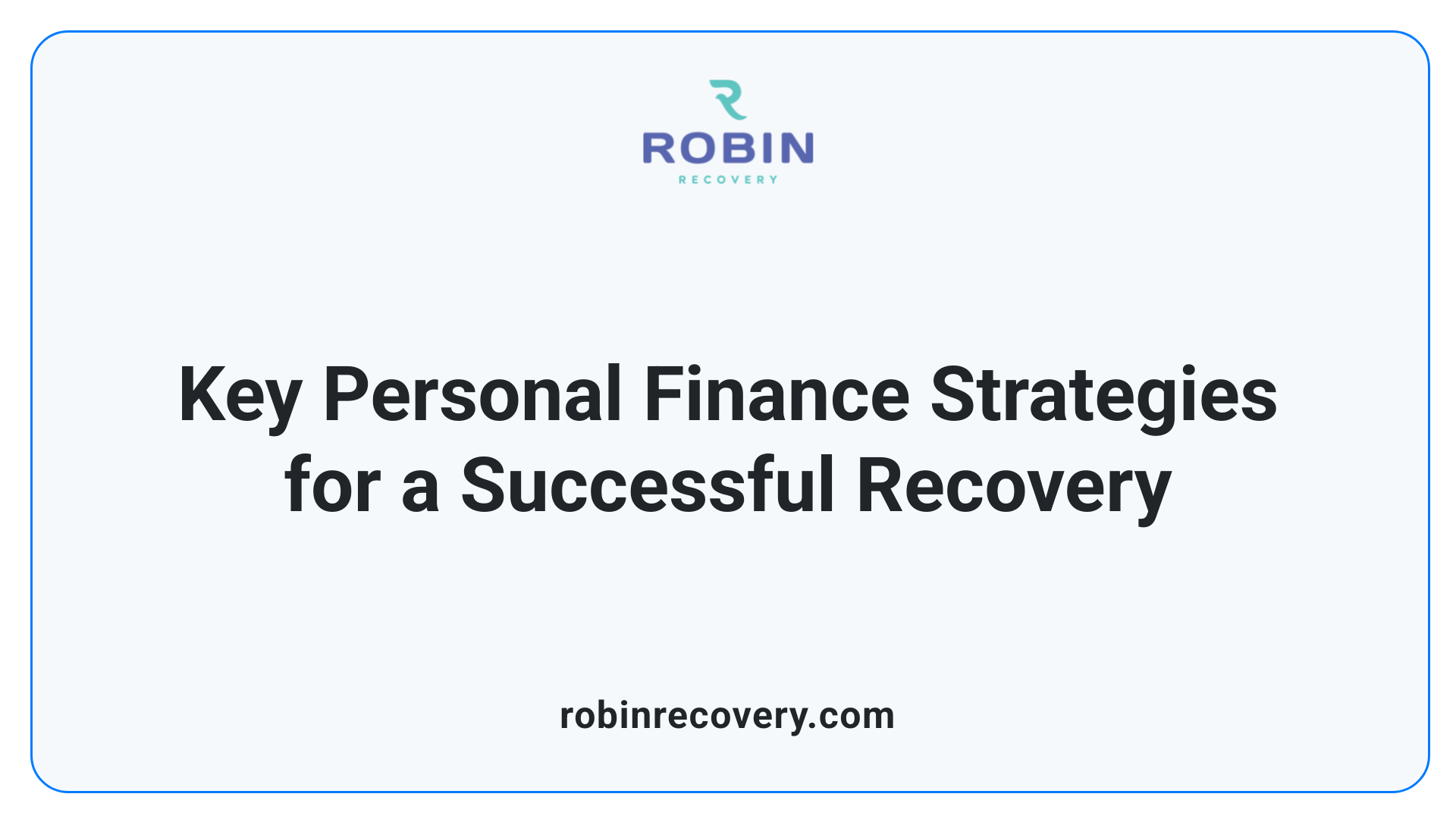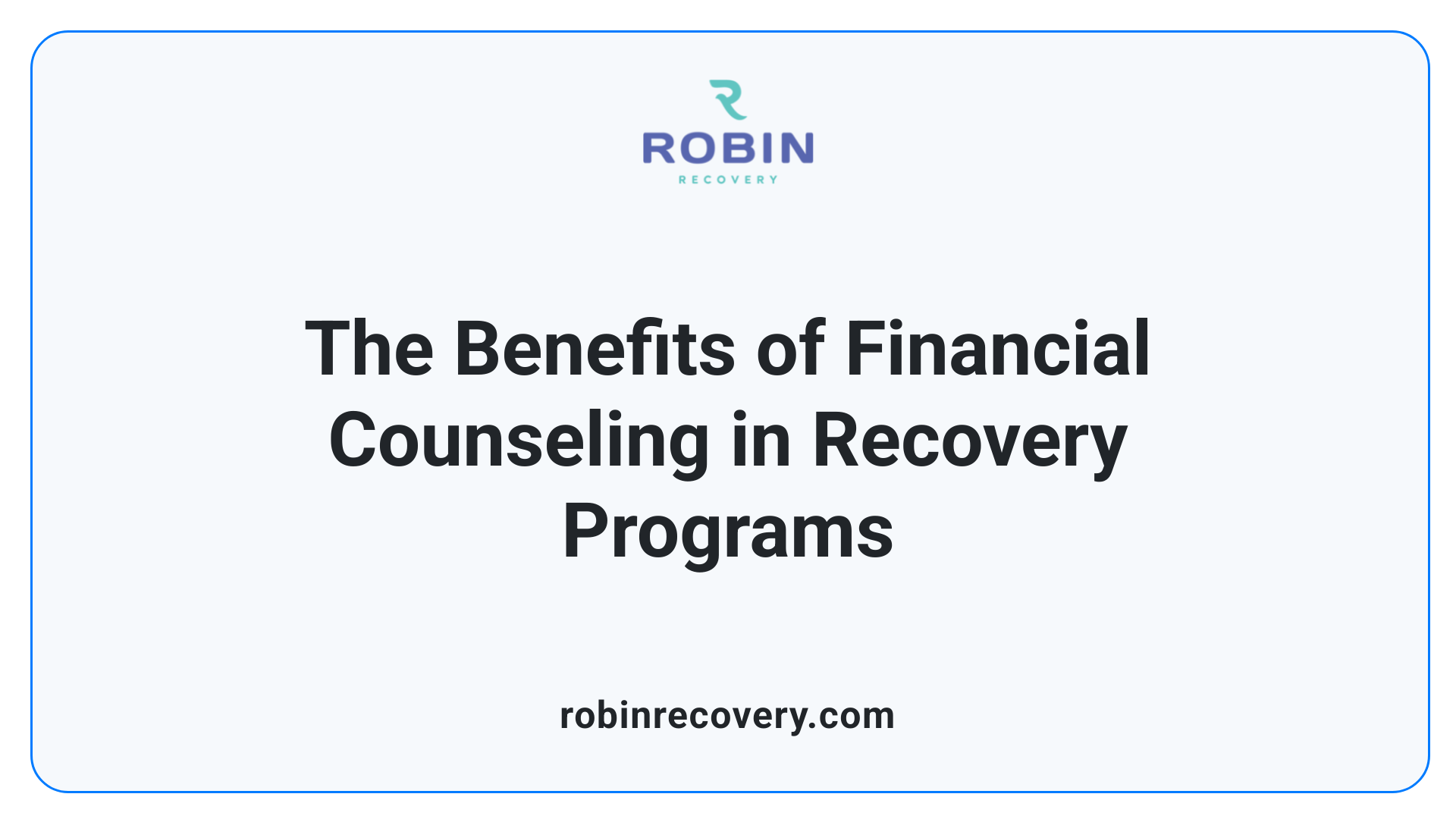The importance of addressing financial challenges in recovery

Understanding the Financial Dynamics of Recovery
Recovering from substance use disorders often involves a multifaceted journey, where financial health plays a crucial role. Beyond the immediate challenges of overcoming addiction, individuals face substantial financial stressors that can impact their recovery process. From handling debt to understanding the importance of financial stability, this article explores the essential financial elements entangled in the recovery landscape.
The Significance of Money Management in Recovery

Why is money management important in recovery?
Money management is crucial in recovery because financial stress can serve as a significant trigger for relapse. Individuals with substance use disorders often face high expenses and potential debt from treatment and legal issues. As a result, effective budgeting becomes essential to maintain financial stability.
A methodical approach to managing finances includes:
- Tracking income and expenses: Knowing where money goes helps identify spending habits.
- Establishing an emergency fund: This fund protects against unexpected financial crises, reducing emotional and financial pressure.
- Timely payments: Consistency in payments can mitigate debt and protect credit scores, further alleviating financial stress.
Steps in effective money management during recovery
A step-by-step approach to financial management can empower individuals in recovery, helping them to avoid unnecessary financial pitfalls. Basic steps include:
- Create a budget: Break down monthly expenses and income to visualize financial health.
- Differentiate between needs and wants: This helps curb impulsive spending habits.
- Seek support: Engaging with mentors, financial advisors, or utilizing budgeting apps can provide accountability and ease the emotional burden.
The role of financial advisors and resources
Financial advisors play a fundamental role in crafting personalized strategies that address the unique challenges faced by individuals in recovery. They can assist with:
- Debt management planning: Helping to navigate and prioritize debts appropriately.
- Credit rebuilding strategies: Guiding individuals on how to restore their credit standing post-addiction.
- Financial literacy improvement: Teaching crucial money management skills, leading to more informed financial decisions.
Incorporating financial counseling into recovery programs not only improves financial wellness but also supports long-term sobriety by fostering empowerment and reducing anxiety related to finances.
Overcoming Financial Hurdles During Recovery

How can individuals overcome financial challenges during recovery?
Overcoming financial challenges during recovery requires a structured approach, starting with identifying the root causes of financial problems. Issues such as poor planning, marital breakdown, or unemployment often lead to substantial debt and financial instability. Recognizing these factors empowers individuals to tackle the underlying issues directly.
Creating and adhering to a budget is essential in this process. Individuals can utilize budgeting software or traditional methods like pen and paper to track income and expenses. This visibility helps in identifying unnecessary expenses. Strategies such as lowering telecommunications costs and designing a food budget can further alleviate financial strain. Moreover, opting to pay in cash instead of using credit can aid in sticking to the set budget more effectively.
What strategies can be implemented to increase income while managing debt?
Increasing income can provide immediate financial relief. Options include working overtime at a current job, or even taking on extra part-time work. Selling unused items around the house can also contribute, as can offering services based on one’s skills, such as tutoring or handyman jobs.
Simultaneously, managing existing debt is crucial. Factors such as understanding credit management—paying bills on time, keeping credit card balances low, and regularly checking credit reports for inaccuracies—serve to improve credit scores over time. A better credit score not only eases financial pressure but can also unlock better borrowing conditions, allowing for further financial stability during recovery.
Additional Strategies to Enhance Financial Health
Establishing an emergency fund is another vital step. This fund helps to mitigate the impacts of unforeseen expenses and prevents the cycle of debt. Seeking assistance from financial professionals or engaging with community support programs can enhance financial literacy, making it easier to navigate the intricacies of managing finances in recovery.
Ultimately, rebuilding financial stability takes time and commitment, but by adhering to these strategies, individuals can foster a healthier financial future alongside their recovery journey.
The Role of Financial Wellness in Successful Recovery

How does financial wellness impact overall recovery?
Financial wellness significantly impacts overall recovery by reducing stress and anxiety associated with financial hardship, which can otherwise hinder treatment engagement and increase the risk of relapse. When individuals in recovery achieve financial stability, they can better focus on their recovery goals and develop healthy coping mechanisms rather than being distracted by financial worries.
Common financial challenges often include debt accumulation and unemployment, situations frequently heightened by substance use. These issues can exacerbate mental health problems such as anxiety and depression, complicating recovery efforts. Individuals may find themselves in a vicious cycle where financial stress leads to substance use as a coping mechanism, further entrenching them in addiction.
To break this cycle, it’s crucial for those in recovery to build financial literacy and create a budget. This provides individuals with the tools to regain control over their finances, helping to lower stress levels and promote stability. Strategies for financial management—including seeking help from financial professionals, setting achievable goals, and recognizing the difference between needs and wants—are essential steps in fostering financial health.
Ultimately, improved financial security contributes to better mental and physical health, fostering a more productive environment for sustained sobriety. Financial counseling integrated into recovery programs can significantly enhance the likelihood of achieving long-term recovery by allowing individuals to focus on healing without the excess burden of financial distress.
Recommended Personal Finance Strategies for Recovery

What personal finance strategies are recommended for individuals in recovery, including budgeting and debt management?
Individuals in recovery face unique financial challenges that require tailored strategies. One of the most effective methods is to create a comprehensive budget. This involves tracking all income and expenses, allowing individuals to manage their finances effectively. By doing this, they can gain more control over their spending, which is essential for maintaining stability during recovery.
Budget Creation and Management
A realistic monthly budget helps in reducing financial stress and promotes better financial literacy. Here’s a quick framework for budget creation:
- Determine Monthly Income: Start by calculating the total income from all sources.
- List Monthly Expenses: Include all necessary expenditures, such as rent, utilities, groceries, and treatment costs.
- Identify Discretionary Spending: Clearly differentiate between needs and wants to curb impulsive spending habits.
- Adjust Accordingly: If expenses exceed income, adjust discretionary spending to ensure a balanced budget.
Debt Reduction Techniques
Managing debt is crucial for those in recovery. Individuals should prioritize repaying high-interest debts and consider methods such as:
- Debt Snowball Method: Focus on paying off the smallest debts first to build momentum.
- Consolidation: Combine debts into a single payment to simplify management and reduce interest rates, if possible.
Importance of Emergency Funds
Building an emergency fund is essential, ideally starting with $500 to $1,000. This fund protects against unexpected financial crises, reducing stress and the risk of reverting to detrimental financial behaviors.
Support and Accountability
Lastly, engaging with financial professionals or seeking help from supportive friends and family can enhance financial literacy and accountability. This external support plays a vital role in directing individuals towards achieving their financial goals and sustaining their recovery journey.
Building Financial Literacy to Support Recovery
How can financial education aid in the recovery process?
Financial education can significantly aid recovery by providing individuals with the knowledge and skills necessary to manage their finances effectively. With a proper understanding of financial principles, individuals can better navigate the challenges they face post-addiction.
Learning to differentiate between needs and wants is crucial. This skill helps curb impulsive spending, a common issue during recovery, allowing individuals to prioritize essential expenses over non-essential ones. Furthermore, training in budgeting, investing, and understanding credit empowers individuals to make informed financial decisions.
Reducing financial strain is essential, as financial stress is a well-known trigger for relapse. Resources such as financial literacy courses, online tutorials, and personalized advice from financial counselors are vital. These tools help in developing responsible financial behaviors that support long-term sobriety.
Tools and resources for learning
Here are some beneficial resources and tools that can enhance financial literacy during recovery:
Resource Type Description Examples Financial Literacy Courses Comprehensive programs teaching budgeting, credit, and more. Community colleges, NGOs Online Tutorials Accessible lessons on financial topics through platforms. YouTube, Coursera Financial Counselors Professional advice for tailored financial strategies. Local support services Support Groups Peer learning and shared experiences focused on financial health. Recovery programs
Utilizing these resources in a structured manner helps individuals build financial confidence while addressing their recovery needs.
Impact of Employment on Financial Recovery
Why is stable employment essential for financial recovery?
Stable employment is a cornerstone of financial recovery, providing a source of income necessary to tackle post-addiction financial hurdles such as debt and ongoing treatment costs.
Employment not only stabilizes income but also embeds a routine and sense of purpose, which is psychologically beneficial during recovery. Having a job supports individuals in rebuilding their lives and sustaining their sobriety. It fosters accountability and daily structure, reducing the likelihood of succumbing to triggers associated with financial stress.
Challenges and opportunities in employment post-recovery
Finding stable employment post-recovery can be fraught with challenges. Many individuals face barriers due to gaps in their work history or previous unemployment stemming from substance use. Additionally, they may experience anxiety related to job performance or stigma.
However, recovery also presents opportunities. Many addiction recovery programs provide job search assistance, including access to resources such as resume writing workshops, interview preparation, and skills training. This support can help individuals navigate the job market more effectively and boost their confidence in securing employment.
Role of support programs in job searching
Support programs are vital to the employment journey for those in recovery. They offer not only job placement services but also networking opportunities that connect individuals with potential employers who understand and are willing to accommodate their recovery journey.
Moreover, counseling and mentoring can address emotional barriers to employment, empowering individuals as they transition back into the workforce. The combination of steady income and supportive resources is essential for long-term financial independence and stability during recovery.
The Psychological Aspects of Financial Stress in Recovery
How does financial stress affect mental health in recovery?
Financial stress is more than just a number; it can deeply influence mental health during the recovery process. High levels of financial anxiety can lead to increased rates of depression and anxiety, making individuals more susceptible to relapse.
When financial difficulties arise, they often create overwhelming pressures that distract from recovery efforts. This distraction can hinder progress, as the individual may struggle to focus on their sobriety while managing debts and expenses.
Strategies for coping with financial-induced anxiety
To counteract the adverse effects of financial stress, individuals in recovery can employ several effective strategies:
- Seek Financial Counseling: Engaging with financial advisors who specialize in recovery can provide practical skills such as budgeting and debt management, empowering individuals to take control of their finances.
- Join Support Groups: Connecting with peers who understand the financial struggles associated with recovery can foster a sense of community and shared experience, which is invaluable for emotional well-being.
- Mindfulness Techniques: Practicing mindfulness and stress-reduction methods can help individuals manage anxiety, encouraging them to stay focused on their recovery goals.
Recognizing and addressing financial stress early is essential, as it plays a critical role in fostering a healthier recovery environment.
The Role of Financial Counseling in Support Program Frameworks

How financial counseling aids recovery programs
Financial counseling integrated into recovery programs provides essential strategies for managing finances, which is crucial for individuals seeking sustainable sobriety. It goes beyond simply tackling debts or budgeting; it fosters a comprehensive understanding of financial wellness. Participants learn to identify triggers associated with spending, thus mitigating the risk of financial stress contributing to relapse. Critical skills such as budgeting, debt management, and credit rebuilding are covered, enabling individuals to regain control over their personal finances.
Examples of financial counseling benefits
The benefits of financial counseling in recovery programs are multifold:
- Preventive Measure Against Relapse: Financial counseling addresses the financial stress that can lead to substance abuse, thus reducing the likelihood of relapse.
- Empowerment and Independence: Individuals develop self-esteem and confidence, taking ownership of their financial situations and making informed decisions.
- Realistic Goal Setting: Guidance in setting achievable financial goals helps minimize overwhelm and reinforces accountability.
- Structured Learning: Participants receive education on creating budgets and tracking expenses, fostering lifelong money management skills.
In essence, incorporating financial counseling within recovery programs not only supports financial stability but also enriches the overall recovery journey, helping to heal mind and wallet alike.
Charting a Stable Financial Path in Recovery
Financial stability is more than just an economic necessity in recovery; it's a fundamental pillar that supports the overarching structure of sobriety. Addressing financial challenges not only curtails stress but strengthens the resolve required to tackle life's adversities post-recovery. By cultivating sound financial habits and seeking guidance, individuals can transform their financial struggles into stepping stones for a brighter, addiction-free future.
References
- Financial Wellness in Recovery: Why Managing Your Money Matters
- Financial Stress and Substance Abuse - The Funding Family
- Financial planning for recovering addicts: Reclaiming stability
- The Role of Financial Counseling in Holistic Addiction Recovery ...
- Guide to Personal Finance in Recovery: An Interview with Tori Utley
- The Importance of Financial Wellness in Recovery - Gateway Rehab
- Guide to Personal Finance in Recovery: An Interview with Tori Utley
- 4 Tips for Money Management in Recovery
